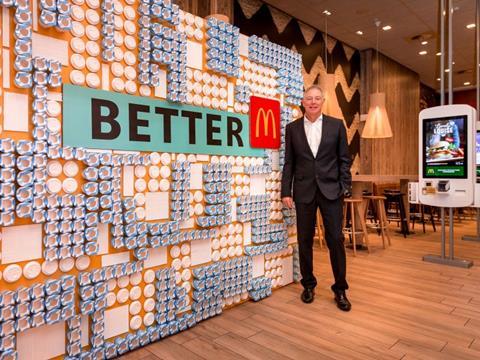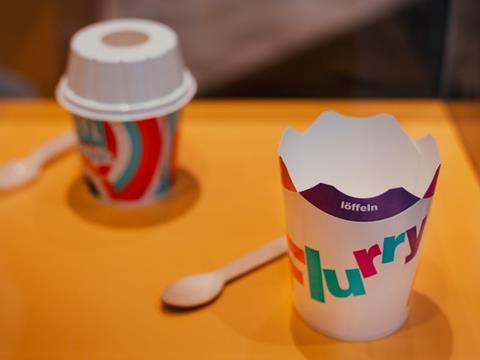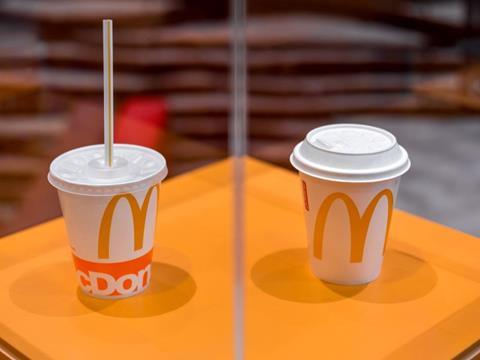
On Thursday, McDonald’s announced a programme the company says aims to remove and minimise plastic and improve recyclability in packaging across Europe.
The plan comprises removal of McFlurry lids across every European country in which McDonald’s operates and the rollout of a new fibre-based lid across all cold drinks in France, as well as trials across markets for alternatives to the plastic McFlurry spoon, a redesigned paper straw, and toy take-back programs.
The packaging trials form part of McDonald’s global ‘Better M’ platform, which aims to implement environmentally positive changes across McDonald’s sustainable packaging and recycling supply chain as well as the customer experience.
Currently, 78% of packaging used by McDonald’s globally is made from fibre. This figure increases for its European markets where fibre comprises approximately 88% of all packaging and plastic only 12%. The steps taken by McDonald’s have the goal to further impact on removal of plastics from its packaging system.
More than 1,200 tonnes of plastic per year will be saved through a makeover of McFlurry packaging which eliminates the need for a separate plastic lid. This change will be fully implemented across Europe by the end of 2020
Approximately 1,200 tonnes of plastic per year will be saved through the introduction of a fibre lid for all cold drinks in France. The new fibre lids are made from 100% certified sustainable sources and recyclable materials
Trials are being conducted for plastic-free McFlurry spoons. Wooden and paper alternatives are being tested, in a bid to find the material that meets customer preferences, operational functionality and sustainability
An evolved paper straw will be rolling out across Europe. Following feedback from customers, and as the packaging industry has evolved, the paper straws being rolled out are now stronger while remaining made of fully recyclable materials. Several markets, including Italy and Portugal, only offer straws on request to cut down material use.
Packaging Europe asked Keith Kenny, Vice President of Global Sustainability at McDonald’s about the challenges that had to be overcome when designing these solutions.

"Functionality is a key challenge. We don't envisage it's likely we'll ever get to zero per cent plastics - the material certainly has a role to play in food safety, food quality and avoiding food waste, which is also a key driver in our strategy. As we continue to develop, the speed we want to roll them out is also a challenge. We want to get them out there and test them. Some of our solutions maybe aren't perfect right now, but they will become better as we keep developing them. For example, with the fibre lid we have launched, we are already working on the next generation of that.”
McDonald’s will launch the trials through existing restaurants across Europe, using its scale to expand successful country trials across the continent. Selected restaurants across Europe will serve as testing grounds, bringing innovative packaging concepts direct to consumers. The feedback collected will inform which options are scaled up or adapted. The model allows McDonald’s to find the sustainable solutions customers want, while delivering the great experience they know and love.
“Scaling has been another challenge to address in the course of the process. When we switched to paper straws in the UK, there wasn't the capacity to do that. As part of the roll out, facilities were developed to produce the capacity for the McDonald's UK programme, and we are now rolling those out across other markets in Europe. We feel that we can use our size, we can to make a change not just across our supply chain, but more broadly,” Mr. Kenny says.
The figures

Currently, 78% of packaging used by McDonald’s globally is made from fibre. This figure increases for its European markets where fibre comprises approximately 88% of all packaging and plastic only 12%. The steps taken by McDonald’s have the goal to further impact on removal of plastics from its packaging system.
More than 1,200 tonnes of plastic per year will be saved through a makeover of McFlurry packaging which eliminates the need for a separate plastic lid. This change will be fully implemented across Europe by the end of 2020
Approximately 1,200 tonnes of plastic per year will be saved through the introduction of a fibre lid for all cold drinks in France. The new fibre lids are made from 100% certified sustainable sources and recyclable materials
Trials are being conducted for plastic-free McFlurry spoons. Wooden and paper alternatives are being tested, in a bid to find the material that meets customer preferences, operational functionality and sustainability
An evolved paper straw will be rolling out across Europe. Following feedback from customers, and as the packaging industry has evolved, the paper straws being rolled out are now stronger while remaining made of fully recyclable materials. Several markets, including Italy and Portugal, only offer straws on request to cut down material use.
Boosting recyclability and reuse
In addition to eliminating plastic and switching to more sustainable materials, McDonald’s is also focused on making the packaging it uses easier to recycle and reuse.
On average, over 60% of our restaurants in eight of McDonald’s largest European markets are already providing recycling for guest packaging. The UK currently stands at 90%, with Germany close behind at 89% of restaurants. By 2025, McDonald’s goal is to recycle guest packaging in 100% of its restaurants globally.
In Europe, McDonald’s has achieved its commitment on fibre. By 2020, 100% of primary fibre-based guest packaging will come from recycled or certified sources where no deforestation occurs.
McDonald’s Germany is currently piloting a programme called ReCup, where customers can ask for a reusable coffee cup and return it at partnering McDonald’s restaurant or other participating restaurants to be cleaned and reused.
From this week, in the UK customers can return used Happy Meal toys to a select number of restaurants so that they can be recycled in a new toy take-back trial
In the Netherlands, restaurants offer recycled paper masks as part of the Happy Meal instead of balloons. Belgium is now introducing paper masks, following great feedback in the Netherlands
Customers in Ukraine can eat the cup they receive their Sundae in – it’s made of waffle.
“There has been a lot of innovation in the space of recyclability. We are trying to streamline the raw materials we use to facilitate recycling. It’s just a case of getting the infrastructure in place. The more we work with other companies, the better results we will achieve, therefore we have been working in cooperation with Starbucks, for example. It’s not about competition, but cooperation,” Mr. Kenny concludes.
















